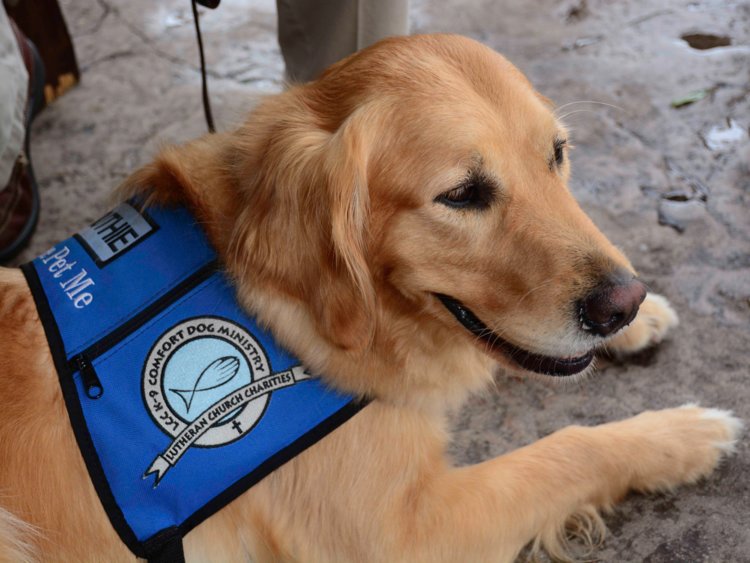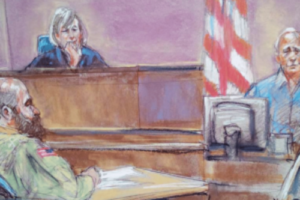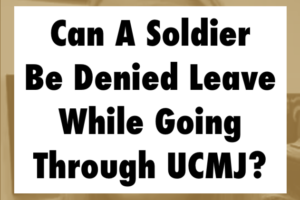
Across jurisdictions there have been an increase in the number of motions filed by government counsel to deny military accused’s the right to confront their child accusers. These motions ask military judges to provide accommodation to children so that they can testify remotely; other motions ask that if the judge will not grant remote testimony, then they seek some kind of partition so that the child would not have to see the accused, and still others ask for accommodations such as a stuffed animal or a pet, and in some cases that pet is a “qualified” comfort animal.
Do Not Roll Over
The purpose of this blog post is to encourage defense counsel to not yield to these types of requests because they necessarily comment improperly on a military accused’s presumption of innocence. Accommodations necessarily communicate to your panel that the child needs protection from your guilty client.
In the motions I have fought and in those I have seen in consultation with other defense counsel, the government counsel glosses over the rather rigid standard to allow such modification. In most instances, they argue circularly that seeing the parent / step-parent / neighbor will upset them or make them become tearful, so “we” should not put the child through it. They equate discomfort with trauma; do not make the same mistake.
Generalized notions of trauma are insufficient to overcome an Accused’s Constitutional right to confront his accuser.
The issue in these kinds of motions is squarely addressed by one Rule for Court-Martial and one Military Rule of Evidence, but falls in the gap established by two Supreme Court opinions that “would give Janus a run for his money.” United States v. Cox, 871 F.3d 479, 492 (Sutton, J., concurring) (referring to Maryland v. Craig, 497 U.S. 836 (1990), and Crawford v. Washington, 541 U.S. 36 (2004)), cert.denied, 138 S. Ct. 754 (Jan. 16, 2018).[1]
The Sixth Amendment to the Constitution provides: “In all criminal prosecutions, the accused shall enjoy the right . . . to be confronted with the witnesses against him . . . .” U.S. Const.amend. VI. A primary interest secured by the Confrontation Clause is the right to cross-examine, which the Supreme Court has described as “the principal means by which the believability of a witness and the truth of his testimony are tested.” Davis v. Alaska,415 U.S. 308, 316 (1974).
The Crucible of Cross-Examination
As a defense counsel I can certainly recognize that the right to cross-examine is not absolute, and the trial judge has the authority to preclude or restrict repetitive or harassing questions. However, cross-examination has historically included the right to challenge a witness’s perceptions and memory and to impeach credibility. Davis, 415 U.S. at 316. In a subsequent case, the Supreme Court identified several grounds upon which a trial judge could appropriately limit cross-examination, including concerns about harassment, prejudice, confusion of the issues, witness safety, or for interrogation that is repetitive or only marginally relevant. Delaware v. Van Arsdall, 475 U.S. 673, 679 (1986).
Foundationally, the Confrontation Clause applies to members of the armed forces during the trial. United States v. Jacoby, 29 C.M.R. 244, 246-47 (C.M.A 1960) (“[I]t is apparent that the protections in the Bill of Rights, except those which are expressly or by necessary implication inapplicable, are available to members of our armed forces.”); United States v. Easton, 71 M.J. 168, 174 (C.A.A.F. 2012) (citingUnited States v. Marcum, 60 M.J. 198, 206 (C.A.A.F. 2004) for the position that “Constitutional rights identified by the Supreme Court generally apply to members of the military unless by text or scope they are plainly inapplicable.”).
Recognizing that it is more difficult to lie about a person while in his presence than “behind his back,” the Supreme Court has acknowledged that witnesses are less likely to wrongfully implicate an innocent person during face-to-face confrontation. Maryland v. Craig, 497 U.S. 836, 846 (1990). Further, the Court noted that the symbolic importance of face-to-face confrontation between the accused and his accuser is so engrained in human nature that it is regarded as “essential to a fair trial.” Maryland v. Craig, 497 U.S. 836, 847 (1990). Accordingly, there is a “preference” for face-to-face confrontation. Maryland v. Craig, 497 U.S. 836, 849 (1990). The right to face-to-face confrontation is not absolute, however, and must occasionally give way to considerations of public policy. Maryland v. Craig, 497 U.S. 836, 850 (1990). One such public policy consideration concerns the protection of minor victims of sex crimes from further trauma and embarrassment, an issue the Supreme Court addressed in Maryland v. Craig.
Remote Live Testimony Addressed in Supreme Court Case Law
In Maryland v. Craig, the Supreme Court considered the issue of whether the Confrontation Clause “categorically prohibits a child witness in a child abuse case from testifying against a defendant at trial, outside the defendant’s physical presence, by one-way closed-circuit television.” Craig, 497 U.S. at 840. The case centered on a Maryland statute that permitted judges to receive, via one-way closed-circuit television the testimony of child witnesses who were alleged to be the victims of child abuse. As a prerequisite to hearing testimony in this manner, the statute required the trial judge to determine that testimony by the child victim in the courtroom would result in the child suffering “serious emotional distress such that the child cannot reasonably communicate.” Id.at 841 (citing Md. Cts. & Jud. Proc. Code. Ann.§ 9-102(a)(1)(ii) (1989)).
Although the defendant objected to this procedure as a violation of the Confrontation Clause, the Court upheld Maryland’s statute, reasoning that the state’s interest in the psychological well-being of child abuse victims “may be sufficiently important to outweigh, at least in some cases, a defendant’s right to face his or her accuser’s in court.” Id.at 853. In doing so, the Court distinguished the statutory procedure in Craigfrom the one the Court invalidated just two years earlier in Coy v. Iowathat allowed the placement of a screen between child witnesses and the defendant based solely upon on a generalized presumption of trauma associated with children testifying in front of their alleged abuser. Coy v. Iowa, 487 U.S. 1012, 1021 (1988).
In Craig, the state presented expert testimony the victims would experience “serious emotional distress” from testifying in front of the defendant (as opposed to by the courtroom generally). Craig, 497 U.S. at 857 (additionally, the Court noted that despite the absence of face-to-face confrontation, the procedure, overall, satisfied the remaining elements of confrontation: oath, cross-examination, and observation of demeanor by the trier of fact.).
Military Framework
The military’s statutory scheme that came into existence after Craig is contained in M.R.E. 611(d). Furthermore, the C.A.A.F. has held that “Craig continues to control the questions whether, when, and how, remote testimony by a child witness in a criminal matter is constitutional.” United States v. Pack, 65 M.J. 381, 384 (C.A.A.F. 2007).
M.R.E. 611(d) allows a child victim or witness to testify from outside the courtroom where the military judge makes the following three findings on the record:
(A) that it is necessary to protect the welfare of the particular child witness;
(B) that the child witness would be traumatized, not by the courtroom, generally, but by the presence of the defendant; and
(C) that the emotional distress suffered by the child witness in the presence of the defendant is more that de minimis. M.R.E. 611(d)(3). After the military judge has determined that the requirements of M.R.E. 611(d)(3) have been satisfied, a child shall be allowed to testify outside the presence of the accused. R.C.M. 914A.
The procedural hurdle in this case, under M.R.E. 611(d)(3), requires a showing by the government that is rarely met.
In most cases, a military accused finds himself accused of acts of child molestation with no physical evidence to support the charges. The critical evidence in the government’s case is almost always the testimony of the child.
As Delmaster informs us, the trauma to the child must be attributable to the presence of the accused, and not be from the court-martial process generally. United States v. Delmaster, No. 20150593, 2018 CCA LEXIS 43, at *2-3 (A.C.C.A. Jan. 31, 2018) (emphasis added). Importantly with respect to interpreting “de minimis” in M.R.E. 611(d)(3), McCollum informs us that it means more than “mere nervousness or excitement or some reluctance to testify.” United States v. McCollum, 58 M.J. 323 (C.A.A.F. 2003) (citing Craig, 497 U.S. at 856).
As Longstreath describes, the military judge should inquire about the psychological consequences of the child testifying in the presence of the accused. 45 M.J. 366, 368 (C.A.A.F. 1996). Similar to many cases where the government attempts to allow a child to testify remotely, Longstreath involved the testimony of a 10 year-old child. In Longstreath, a clinical psychologist and Ph.D.-educated expert described her opinion that the child “would probably have more nightmares, become more anuretic, more encopretic, have more difficulty in concentrating and attending to stimuli. I think that she’d become more emotionally constricted and isolated.” Id.
Merely being upset generally about participating in a trial does not meet the standard.
Motion Response
For access to a motion response to a government motion requesting remote live testimony and other accommodations, please consider becoming a member of the International Association of Military Defense Lawyers at www.iamdl.org.
Expert Opinions
In many cases, the government brings only a treating clinician to attempt to lay the predicate foundation that the child should be able to testify remotely. In your response brief, make a Daubertchallenge. Then ask to conduct voir dire of the provider to challenge them from making any conclusions. You may not be able to preclude the testimony altogether, but often you will be able to limit the scope of the testimony in support of the motion. It is crucial to highlight the shortcomings of the proponent witness’ predictions about what impact testifying would have on the child.
For access to a comprehensive list of suggested questions to pose to a treatment provider that is attempting to support remote live testimony, please consider becoming a member of the International Association of Military Defense Lawyers at www.iamdl.org/
The Ruling You Hope to Get
In this case, the government has failed to establish that remote testimony is necessary to protect the welfare of this child witness because there is insufficient evidence that the child witness would be traumatized, not by the courtroom generally, but by the presence of the defendant. Any emotional distress that she will suffer in the presence of the defendant is de minimis. She is able to resume her normal demeanor within minutes of discussing the alleged offenses with her therapist. Upon the receipt of additional therapy sessions to discuss coping strategies in the more than XX weeks between now and trial and reassurances by counsel, family members, and members of the court that her safety is assured, it is unlikely that the added factor of recounting her story with her alleged perpetrator present will cause her more than short-term and de minimis anxiety and other symptoms. Therefore, at this juncture, there is insufficient basis to allow the alleged victim to testify remotely.
Similarly, there is insufficient basis to allow the government’s alternative remedies. The presence of a support animal or a partition, or an unconventional courtroom configuration to prevent the victim from seeing the accused, are unjustified when weighed against the erosion of the accused’s presumption of innocence and the prejudice that would result from such accommodations.
Do Not Roll Over!
Do not roll over to “rover” or to any accommodations; they improperly comment on your client’s presumption of innocence. The Special Victim Prosecutor in the case I litigated this issue in, had the audacity to say to me “how could you put [the child] through testifying in front of her dad? She cries any time she thinks about having to do that.” That is not my concern, and frankly I do not care. It is our system of justice that champions the presumption of innocence and demands his right to confront his accuser. Do not be intimidated, do not let them try to tug at your heartstrings (though I am unsure if I have upon which to tug), and do not accept that the government has met the standard when they very likely will not be able to do so.
You Might Also Like These Articles The difference between nonjudicial punishment and court-martial involves multiple factors that include who is going to be the decision maker… Can a soldier be denied leave while going through UCMJ? [embed] https://www.youtube.com/watch?v=ec6eNqyZq4A [/embed] The short answer is yes, but it… I am struggling to know where boundaries should be drawn with my clients. Resounding praise stems from clients who know…






 REQUEST A CONSULTATION
REQUEST A CONSULTATION 